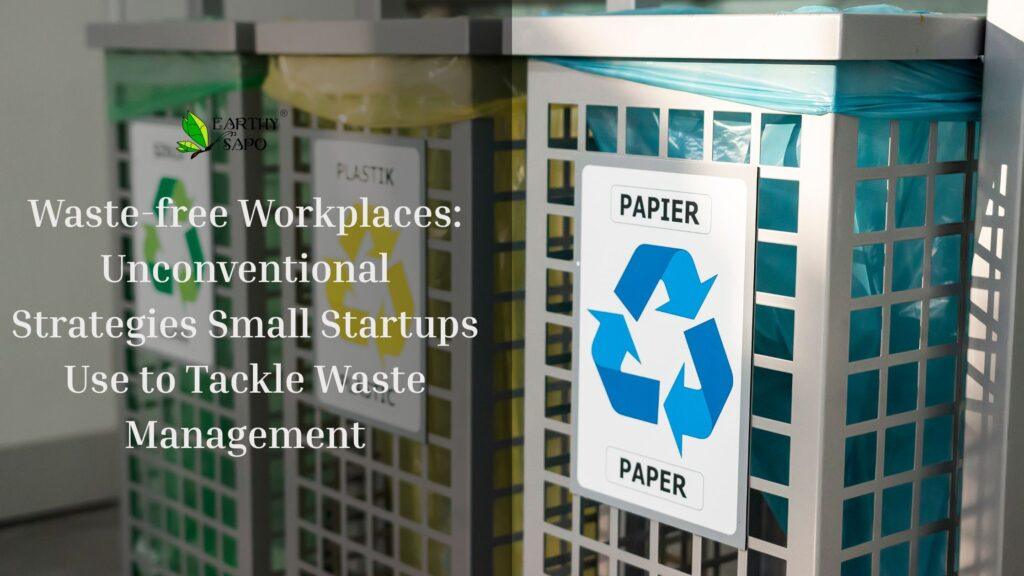Uncategorized
Waste-free workplaces: unconventional strategies small startups use to tackle waste management
In an era where environmental sustainability is at the forefront of global conversations, small startups are pioneering waste management strategies that challenge conventional norms. These trailblazing entrepreneurs demonstrate that zero waste isn’t just an ethical choice—it’s a smart business move. By thinking outside the trash bin, these innovative startups are transforming how we perceive corporate sustainability and workplace waste management. From reimagining sustainable sourcing methods to embracing circular economy principles, these unconventional strategies are steering the ship towards a greener future.
Redefining Procurement: Sourcing with a Sustainability Lens
The journey towards waste-free workplaces often begins at the root: procurement. Forward-thinking startups are redefining sourcing by emphasizing eco-friendly suppliers, recyclable materials, and minimal packaging. By prioritizing green procurement and sustainable supply chains, startups not only reduce workplace waste but also cultivate a more conscious business ecosystem. This strategic shift significantly reduces the influx of non-recyclable or single-use plastics, a feat that is both environmentally sound and cost-effective in the long run.
Innovative Reuse: Breathing New Life into Discarded Materials
One person’s trash is another person’s treasure—and startups are taking this to heart. Rather than hastily discarding materials, these companies adopt innovative reuse practices. Whether it’s upcycling office furniture or creatively repackaging products, startups are turning waste into resource. This inventive mindset reinforces the idea that waste reduction isn’t just about disposal—it’s about repurposing and waste minimization through creativity and practical innovation.
The Power of Upcycling: From Waste to Desirable Products
Upcycling solutions aren’t just trending—they’re transformative. Startups are using this strategy to craft unique, high-value products from what others see as waste. From sustainable fashion brands making stylish garments from reclaimed fabrics to eco-conscious furniture makers repurposing industrial waste, upcycling is redefining eco-conscious product design. It highlights how green business practices can drive brand value and attract environmentally conscious consumers.
Circular Economy Champions: Closing the Loop on Waste
Circular economy startups are making waves by keeping products in use for as long as possible. These forward-thinking companies are designing items with durability, repairability, and end-of-life reuse in mind. By promoting product lifecycle extension and launching repair and take-back programs, they ensure that fewer products end up in landfills. This closed-loop system supports resource conservation and helps businesses adopt low-waste operations aligned with modern ESG goals.
Education and Empowerment: Cultivating Waste-conscious Employees
From Waste to Wisdom: Collaborative Initiatives
Small startups are proving that eco-friendly business practices thrive on collaboration. Many join forces with local communities, NGOs, and fellow startups to implement shared waste management systems. Whether it’s co-working spaces pooling recycling resources or industrial clusters launching joint sustainability drives, these partnerships amplify impact. Sustainable collaboration highlights that collective effort is key in solving large-scale environmental issues.
Tech-Driven Waste Tracking: Analytics for Sustainable Practices
Technology is a powerful ally in the journey toward waste reduction in offices. Startups are leveraging waste analytics and digital tools to monitor, track, and optimize their disposal and recycling processes. Through data-driven decisions, these companies identify patterns, pinpoint problem areas, and apply predictive waste management models. These smart systems improve operational efficiency and significantly lower waste footprints.
Pioneering a Waste-Free Future
As the world grapples with mounting waste, small startups are leading a quiet revolution. Their unconventional strategies—from rethinking procurement to implementing circular waste systems—highlight that waste management is not just a responsibility but a powerful innovation platform. These businesses are reshaping the way we view waste and showing how sustainable operations can yield not just environmental but also social and economic returns. With every new startup joining the zero-waste movement, the vision of a truly sustainable, green workplace culture becomes more achievable.

